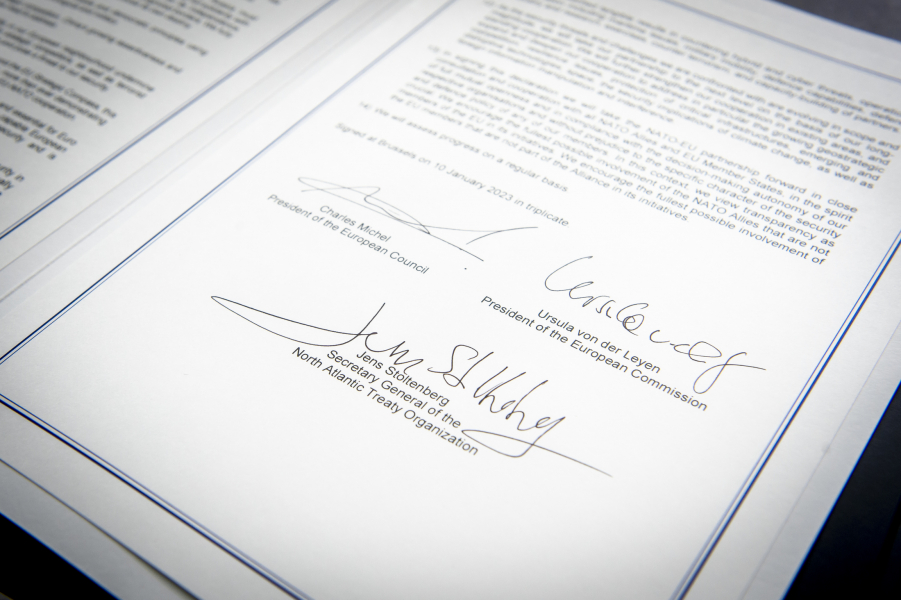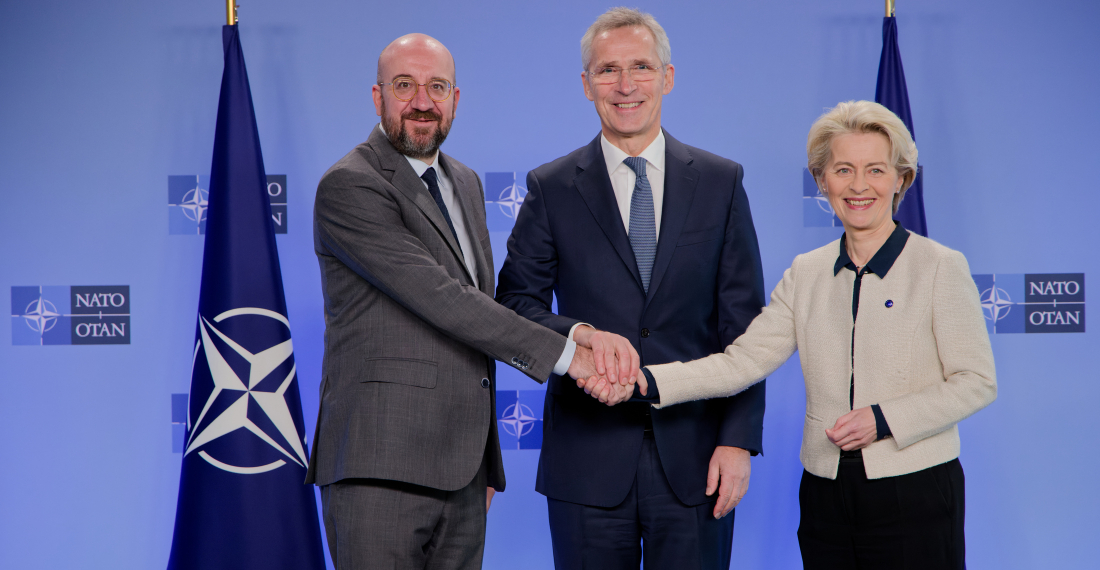On 10 January 2023, the EU and NATO signed a Joint Declaration in Brussels. They condemned in the strongest possible terms Russia’s aggression against Ukraine and reiterated their unwavering support to the country.
The declaration also sets out a shared vision of how the EU and NATO will act together against common security threats. The EU and NATO will expand and deepen their cooperation on areas such as:
- the growing geostrategic competition
- resilience and the protection of critical infrastructure
- emerging and disruptive technologies
- space
- the security implications of climate change
- foreign information manipulation and interference.
NATO Secretary General Jens Stoltenberg, the President of the European Council, Charles Michel, and the President of the European Commission, Ursula von der Leyen, met on Tuesday (10 January 2023) at NATO Headquarters to sign the third Joint Declaration on NATO-European Union cooperation.
Speaking at a joint press conference, Mr Stoltenberg said: “we are determined to take the partnership between NATO and the European Union to the next level.”
The Joint Declaration aims to further strengthen and expand the strategic partnership between NATO and the EU, building on unprecedented progress in cooperation between the two organisations since previous declarations were signed in 2016 and 2018.
The leaders resolved to address growing geostrategic competition, resilience issues, and the protection of critical infrastructures. Other priority areas of work will include emerging and disruptive technologies, space, the security implications of climate change, foreign interference and information manipulation. The Secretary General underlined that the Joint Declaration “recognises the value of a more capable European defence that contributes positively to our security and is complementary to, and interoperable with, NATO”.
Mr Stoltenberg stressed the importance of NATO-EU cooperation in the context of the changed security environment following Russia’s invasion of Ukraine. He further noted that the NATO-EU partnership “will become even more important once Finland and Sweden become full NATO members,” and that "with their accession, NATO will be protecting 96% of the citizens in the European Union, and a higher share of its territory than ever before.
FULL TEXT OF THE DECLARATION

This is the text of the Joint Declaration in full:
- The NATO-EU strategic partnership is founded on our shared values, our determination to tackle common challenges and our unequivocal commitment to promote and safeguard peace, freedom and prosperity in the Euro-Atlantic area.
- Today, we are faced with the gravest threat to Euro-Atlantic security in decades. Russia’s brutal war on Ukraine violates international law and the principles of the UN Charter. It undermines European and global security and stability. Russia’s war has exacerbated a food and energy crisis affecting billions of people around the world.
- We condemn in the strongest possible terms Russia’s aggression. Russia must immediately stop this war and withdraw from Ukraine. We express our full solidarity with Ukraine and reiterate our unwavering and continued support for its independence, sovereignty and territorial integrity within its internationally recognized borders. We fully support Ukraine’s inherent right to self-defence and to choose its own destiny
- Authoritarian actors challenge our interests, values and democratic principles using multiple means – political, economic, technological and military.
- We live in an era of growing strategic competition. China’s growing assertiveness and policies present challenges that we need to address.
- Persistent conflict, fragility and instability in our European neighbourhood undermine our security and provide fertile ground for strategic competitors, as well as terrorist groups, to gain influence, destabilise societies and pose a threat to our security.
- As underlined by both the NATO Strategic Concept and the EU Strategic Compass, this is a key juncture for Euro-Atlantic security and stability, more than ever demonstrating the importance of the transatlantic bond, calling for closer EU-NATO cooperation.
- NATO remains the foundation of collective defence for its Allies and essential for Euro Atlantic security. We recognise the value of a stronger and more capable European defence that contributes positively to global and transatlantic security and is complementary to, and interoperable with NATO.
- Our mutually reinforcing strategic partnership contributes to strengthening security in Europe and beyond. NATO and the EU play complementary, coherent and mutually reinforcing roles in supporting international peace and security. We will further mobilize the combined set of instruments at our disposal, be they political, economic or military, to pursue our common objectives to the benefit of our one billion citizens.
- Building on the 2016 Warsaw Joint Declaration and the 2018 Brussels Joint Declaration, which significantly expanded the breadth and depth of our partnership established more than twenty years ago, we have achieved unprecedented progress across all areas of cooperation.
- We have reached tangible results in countering hybrid and cyber threats, operational cooperation including maritime issues, military mobility, defence capabilities, defence industry and research, exercises, counter terrorism, and capacity-building of partners.
- As the security threats and challenges we are confronted with are evolving in scope and magnitude, we will take our partnership to the next level on the basis of our long-standing cooperation. We will further strengthen our cooperation in existing areas, and expand and deepen our cooperation to address in particular the growing geostrategic competition, resilience issues, protection of critical infrastructures, emerging and disruptive technologies, space, the security implications of climate change, as well as foreign information manipulation and interference.
- In signing this declaration we will take the NATO-EU partnership forward in close consultation and cooperation with all NATO Allies and EU Member States, in the spirit of full mutual openness and in compliance with the decision-making autonomy of our respective organisations and without prejudice to the specific character of the security and defence policy of any of our members. In this context, we view transparency as crucial. We encourage the fullest possible involvement of the NATO Allies that are not members of the EU in its initiatives. We encourage the fullest possible involvement of the EU members that are not part of the Alliance in its initiatives.
- We will assess progress on a regular basis.
Signed at Brussels on 10 January 2023 in triplicate.
Charles Michel
President of the European Council
Ursula von der Leyen
President of the European Commission
Jens Stoltenberg
Secretary General of the North Atlantic Treaty Organization







